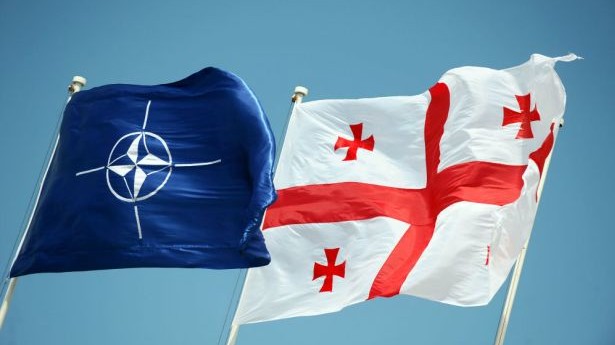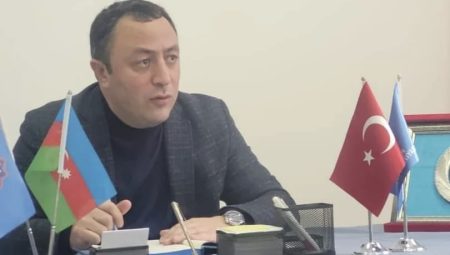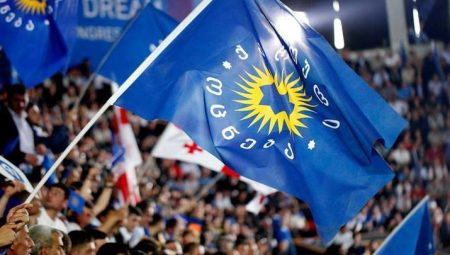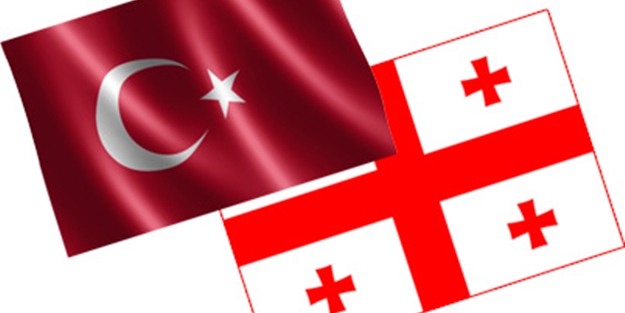Georgia’s decision to shield its citizens from the immediate effects of international financial sanctions has vexed the United States and sown the seeds for more potential trouble in Washington-Tbilisi ties.
The decision also set off market turmoil and raised questions about the nation’s future within the global economic order. Georgia’s financial regulator, which is responsible for the decision, tried to issue reassurances on all those fronts.
The appearance of the first Georgian national on Washington’s Ukraine war-related blacklist spurred a maelstrom of debate on how Georgia should proceed with enacting international sanctions against its citizens.
“This was the first precedent for us,” said Natia Turnava, acting president of the National Bank of Georgia (NBG). “Unlike other countries that have long put in place rules and regulations for such cases, we had a legal gap that we had to fill.”
At first glance, the matter seemed straightforward. Georgia had previously volunteered to automatically comply with the U.S. extraterritorial freeze-and-seize directives. Just like American banks, Georgian banks simply had to freeze the sanctioned individuals’ assets and suspend all their transactions.
But in this case, the NBG staged an intervention. Over in-house objections, Turnava issued a new executive order that ended the copy-paste approach. Under her order, only a local court’s order can warrant the automatic freezing of assets of internationally sanctioned Georgian citizens.
Turnava maintains that her decision helped reconcile international sanctions with national law. “We did this because we had to find a solution that does not contradict the Constitution, which defines the rights of Georgian citizens and also defines the mandate of the National Bank as an institution,” Turnava told Eurasianet. “Otherwise, we would have had a constitutional suit on our hands.”
Drawing a line between international sanctions and national law could have been indeed left to the Constitutional Court, but Turnava argues that “a constitutional suit against us would have dealt huge reputational damage to the National Bank and to economic stability.”
Her detractors argue that the damage done by her decision far outweighed the reputational cost of a potential Constitutional Court litigation.
The ground under Georgia’s financial universe began to shake the moment NBG made its move. The International Monetary Fund, a global guarantor of financial stability and investor confidence, said it was going to re-evaluate its commitments to Georgia. The national currency, the lari, took a dive and NBG had to buy up tens of millions to rein in the trend.
“People started calling us to ask if it was safe to keep money in the banks,” Giorgi Kepuladze, founder of the Society and Banks, a finance think-tank, told Eurasianet. “Going against the US and international financial institutions created fears that the banking sector was going to collapse, and it took a lot of money and effort to calm things down.”
NBG’s play also touched off a flurry of foreign policy-themed opprobrium. The entire spectrum of opposition groups, watchdogs and observers said that this decision was another blow to the already wobbly partnership with the U.S. Washington, for its part, made its disappointment with the decision known.
Dismissing the criticism, Turnava insists that Georgia’s commitments to the West and the global financial architecture remain strong.
Describing her decision as purely “technical,” she says that NBG, from its regulatory vantage point, had to weigh Georgian banks’ legal commitments to their domestic clients, international lenders and national laws, and find a Goldilocksian middle ground.
That solution does not necessarily shield Georgian citizens from international sanctions, she argued. It essentially shifts responsibility for making international sanctions-related decisions to commercial banks.
“Even without a court order in place, commercial banks can still suspend services to an internationally sanctioned Georgian citizen if providing such services is deemed of risk to the bank’s safe and stable operations,” Turnava said.
Put simply, the regulator and the banks have swapped roles. Instead of ordering commercial banks to comply with international sanctions, as was the case before, NBG will be reviewing the decisions banks make in regard to their clients who appear on international sanctions lists.
A Eurasianet source in one of Georgia’s largest banks said that the banking sector is not too happy with the change. “On one hand, NBG shook off the responsibility and passed the buck on to us [commercial banks]. On the other hand, they retained the right to override whatever decision we make, if politicians tell them to do so,” the source said.
Critics allege that the ruling party, Georgian Dream, twisted Turnava’s arm to change the rule as a protection for its loyalists.
The sanctioned individual, ex-prosecutor general Otar Partskhaladze, has close ties with Georgian Dream and its all-powerful founder, billionaire Bidzina Ivanishvili. The State Department said that Partskhaladze, who also holds Russian citizenship, maintains ties with Russian security services and promotes the Kremlin’s interests. Various members and supporters of the ruling party actively spoke up for Partskhaladze and demanded Washington present evidence for its accusations.
When the attention turned to NBG, the regulator initially indicated that it was going to apply sanctions against Partskhaladze, but changed tack after Georgian Dream chairman Irakli Kobakhidze warned NBG against it, saying that NBG would find itself in breach of the constitution by ordering banks to suspend services to Partkhaladze. Turnava later made the same point.
This sequence of events and also the fact that Turnava’s decision was met with ardent objections from her own colleagues, feeds claims that she did Georgian Dream’s bidding. Three members of the NBG board immediately resigned in an apparent protest and a number of employees did the same in the following weeks.
Turnava insists that she does not take orders from Georgian Dream and its chairman Kobakhidze. “If that was the case, why would Kobakhidze talk about it publically on TV? He could’ve just called me on my phone,” she argued.
But Georgian Dream could have wanted to make a public show of protecting one of their own. “I don’t think it was necessarily about that one man, it was rather to reassure their ranks, to tell supporters that Georgian Dream has their backs, no matter what,” Kepuladze said. “There is obviously a lot of concern about what worsening of the relations with the U.S. could mean for the Georgian Dream rank and file.”
Critics argue that the decision fits with a recent pattern in Georgia’s dealings with the U.S., and broadly the West, over the past couple of years.
Once a staunch ally, Tbilisi has over the past year and a half or so adopted a defiant, borderline-obstreperous tone toward the U.S. and EU. In response to American and European calls for more democracy in Georgia, the ruling establishment upbraided the U.S. and EU ambassadors. Some members of Georgian Dream last year broke off and set up a separate group, a poorly veiled extension of the ruling party, specifically to attack the West.
Most recently, the Georgian security service went as far as to accuse Washington’s international assistance arm, USAID, of sponsoring an event geared toward staging a revolution in Georgia.
For its part, Washington earlier this year barred four controversial Georgian judges from entering the U.S. in an unprecedented display of Washington’s frustration with the lack of progress in securing the independence of the judiciary in Georgia.
At the same time, Tbilisi refused to follow the West’s suit and cut trade ties with Russia over Ukraine and has earned gifts and commendations from Moscow. The political opposition claims that Georgia is in the middle of a volte-face, turning its back on the West and embracing Russia.
More moderate opinion holds that Georgian Dream-ruled Georgia still wants to integrate with the West and the EU specifically, but wants to do it on its own terms, that is, not as a developed liberal democracy but rather as a self-centered, democratically questionable regime akin to Victor Orbán’s Hungary (Orbán is incidentally in Tbilisi today and has become Georgian Prime Minister Irakli Garibashvili’s best European friend recently).
Georgia’s messaging to the West does appear to pull in opposite directions. Georgian Dream remains defiant in its tone about the sanctions decision, while Turnava appears to be making bona fide efforts to reassure Georgia’s Western partners and pro-Western voters at home. She met representatives of international organizations and Western diplomats, and spoke actively to the news media.
“Georgia’s moving away from the West is unthinkable and it is not just about political will: we are closely integrated with the international financial system and there is neither an intention nor a possibility to pull out of it,” Turnava said.
Kepuladze argues, however, that the U.S. and Georgia are on a negative trajectory, and matters are bound to get worse. “Georgian Dream may think it can get away with decisions like this and can keep pushing the line, but people in the U.S. are taking note of every such move and every unfriendly statement, and they will find a way to respond.”





